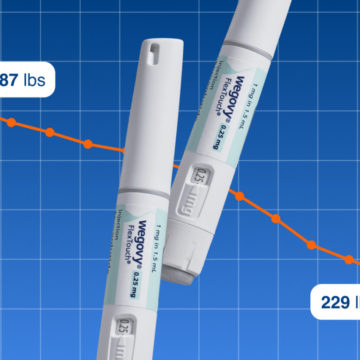With more people turning to medical support for weight management, GLP-1 receptor agonists like Wegovy and Ozempic have become two of the most well-known and widely prescribed weight loss medications.
But, while they contain the same active ingredient—semaglutide—they’re not identical treatments. Each is designed for different health needs, prescribed under different guidelines, and approved for different conditions. If you’re wondering which is right for you, this guide will help you understand the differences between Wegovy and Ozempic, and how to speak with your healthcare provider about choosing the most appropriate option for your goals.
From differences in how they’re administered to cost, side effects, and prescription based on body mass index (BMI) or chronic conditions, we’ll walk you through everything you need to know.
Understanding semaglutide: the common ingredient in Wegovy and Ozempic
Both Wegovy and Ozempic are brand name medications that contain the same active ingredient: semaglutide. This powerful medication belongs to a class of drugs called GLP-1 receptor agonists, which are prescribed to help manage weight and/or type 2 diabetes. Though the medication is the same, the ways in which Wegovy and Ozempic are used, dosed and prescribed vary.
What is semaglutide?
Semaglutide is a synthetic version of a natural hormone called GLP-1 (glucagon-like peptide-1). This hormone helps regulate blood sugar and appetite. Semaglutide is delivered via weekly subcutaneous injections, meaning it’s injected under the skin once a week. Once-weekly semaglutide helps to reduce appetite to support weight loss over time. [1]
How does it work in the body?
Semaglutide works by mimicking GLP-1, which:
- Slows digestion, helping you feel full for longer
- Reduces appetite, so you naturally consume fewer calories
- Stimulates insulin production after eating, helping to lower blood sugar
- May lower blood pressure and support better cardiovascular health
When combined with lifestyle changes like a healthy diet and regular exercise, once-weekly semaglutide injection can lead to significant reductions in body weight and improvements in overall health.
What are the pros and cons of Wegovy vs. Ozempic?
Here’s how the two semaglutide-based medications compare at a glance:
Wegovy Pros
- Specifically approved for weight management
- Higher doses of up to 2.4 mg weekly are available
- Results are backed by extensive clinical trials focusing on weight loss
- Specifically designed to help manage people with obesity or those who are overweight
Wegovy Cons
- Can be more expensive than Ozempic
- Not approved for type 2 diabetes treatment
- Availability can be limited in some regions
Ozempic Pros
- Designed and approved for type 2 diabetes management
- Can support weight loss as a secondary benefit
- May be more readily available than Wegovy
- Lower starting doses make it easier for the body to tolerate initially
Ozempic Cons
- Not officially approved for weight loss
- Lower maximum dose (1 mg or 2 mg weekly, vs. 2.4 mg in Wegovy)
MHRA-approved uses of Wegovy and Ozempic
The Medicines and Healthcare products Regulatory Agency (MHRA) has approved each drug for a different primary purpose:
Wegovy’s role in obesity management
Wegovy has been developed and researched specifically for weight management. It’s prescribed to help people with obesity or overweight people reduce their body weight, alleviating existing health conditions related to obesity (such as type 2 diabetes, cardiovascular problems, kidney failure, high cholesterol levels, etc) or the risk of developing them. [2]
Wegovy is approved in the UK for weight loss and long-term weight management in adults with:
- A BMI of 30 or higher
- A BMI of 27 or higher with at least one weight-related health condition (such as high blood pressure or sleep apnea)
Ozempic’s use in diabetes treatment
Ozempic is approved for managing type 2 diabetes, with the added benefit of weight loss as a secondary outcome. It’s not officially approved for weight loss in people without diabetes, but some healthcare providers prescribe it off-label for that purpose. [3]
Effectiveness in weight loss
Both Wegovy and Ozempic are proven to help with weight loss to different degrees, though Wegovy has been specifically designed and researched for this purpose. GLP-1 receptor agonists like semaglutide work best when combined with healthy lifestyle changes.
Comparison of weight loss results: clinical trials and findings
Both medications have been widely studied in clinical research. A major clinical trial found that people with obesity using 2.4 mg of Wegovy weekly lost an average of 14.9% of their body weight over 68 weeks. [4] Another study showed that people with type 2 diabetes using 1 mg of Ozempic weekly lost around 5–7% of their body weight. [5]
Higher strengths of Wegovy lead to greater weight reductions overall, due to its higher dosing and targeted approval for weight management. Meanwhile, Ozempic is still primarily used to manage blood sugar levels in type 2 diabetes.
Dosage and administration
Both weight loss injections are prescribed with careful dosing schedules. This involves starting with a lower dose that is gradually increased over time to reduce side effects and ensure safe, effective results.
Wegovy dosing
- Administered once weekly via subcutaneous injection
- Starting dose of 0.25 mg weekly, which is gradually increased to 2.4 mg as long as the medication is well tolerated
Ozempic dosing
- Also administered weekly via subcutaneous injection
- Starting dose of 0.25 mg weekly, which is typically increased to 1—2 mg as long as the medication is well tolerated.
Common side effects and risks
Some side effects are associated with semaglutide injections of any kind. This is usually managed by starting with a low dose to allow the body to adjust to the medication and increasing it gradually over time.This is called titration. Many people don’t experience serious side effects, but both medications are most commonly associated with digestive side effects.
Very common side effects for both Wegovy and Ozempic
- Nausea
- Diarrhoea
Wegovy is also associated with constipation, vomiting, headache and fatigue. [4, 6, 7, 8]
Rare but serious risks: retinopathy concerns
Rarely, more serious risks have been associated with both Wegovy and Ozempic, such as diabetic retinopathy in those with poorly managed diabetes. Patients with cardiovascular disease, kidney failure, high blood pressure, or elevated cholesterol levels should be closely monitored when using semaglutide medication. [9]
Eligibility criteria for Wegovy and Ozempic
It’s important that a trained healthcare expert reviews your health profile to decide whether semaglutide injections are safe for you to use. This will depend on your medical history, current medications, and overall risk profile. Both Wegovy and Ozempic are designed for those focused on long-term results and management of their conditions.
Who should use Wegovy?
Every case must be reviewed by a healthcare professional, but in general, Wegovy can be prescribed to adults with obesity with a BMI over 30, or a BMI over 27 who also have a weight-related health condition.
Who should use Ozempic?
Again, every case is reviewed by a clinical expert, but Ozempic is generally prescribed to adults with insufficuently controlled type 2 diabetes.
How much do Wegovy and Ozempic cost?
In the UK, the price of any weight loss medication varies depending on the pharmacy, availability of the drug (which can change over time), and whether you’re being prescribed it privately or via the NHS. They are generally similarly priced. Bear in mind that Ozempic is only licensed for those with type 2 diabetes, meaining it may be less available than Wegovy.
However, it may be considered off-label for weight management at the discretion of the prescriber.
Long-term usage and safety
Both Wegovy and Ozempic are intended for long-term use, with treatment often lasting 12–24 months or even longer. There is no set time period and we support weight loss maintenance with medications so long as BMI remains above 21. Healthcare providers monitor treatment progress, adjust dosing, and evaluate when it’s appropriate to stop based on the results that have been achieved.
In general, treatment can be stopped once a healthy body weight is achieved and maintained, however, weight regain is likely when medication is stopped due to the fact that obesity is a long-term chronic health condition. If serious side effects occur, providers and their patients may decide to discontinue use.
Wegovy is more likely to be used over a specific period of time for weight loss, while Ozempic may remain a permanent part of care in managing type 2 diabetes.
Transitioning between medications
In some cases, patients may switch between Wegovy and Ozempic under the guidance of their healthcare provider. A switch might be made because of:
- Concerns about availability or supply shortages
- Cost differences
- Side effects or lack of results
- Changes in diagnosis (e.g. from pre-diabetes to type 2 diabetes)
Switching should always be done under medical supervision, with proper monitoring of dose transitions, side effects, and treatment outcomes.
So which is better for weight loss, Wegovy or Ozempic?
Both Wegovy and Ozempic contain the same active ingredient (semaglutide), but they’re designed for different primary purposes and prescribed in different ways.
Here’s a quick summary of the key similarities and differences:
- Wegovy is specifically approved for weight loss and obesity management. Clinical trials have shown that it leads to a greater average reduction in body weight.
- Ozempic is approved for treating type 2 diabetes, with weight loss as a secondary benefit. It typically results in more modest weight reduction than Wegovy.
- Wegovy offers higher doses of semaglutide (up to 2.4 mg weekly) compared to Ozempic (1–2 mg weekly), which may explain the difference in weight loss outcomes.
- Both medications are taken once weekly via subcutaneous injection, starting at a low dose that gradually increases over time.
- Side effects are sometimes experienced when using semaglutide injections, and these are similar between Wegovy and Ozempic (typically nausea, diarrhoea, and vomiting). These can be managed by a low initial starting dose that is increased gradually over time.
- Both treatments are intended for long-term use, but Wegovy is usually discontinued once a healthy weight is achieved, whereas Ozempic is used as a longer-term or permanent part of diabetes management.
Your healthcare provider will help determine which medication is best suited to your needs, based on your medical history, weight loss goals, and treatment response. Ultimately, Wegovy is best suited to people looking to lose weight while Ozempic is better for those with diabetes.
Start your journey in discovering which weight management options may be suitable for you on our website.
References
- Blundell J, Finlayson G, Axelsen M, Flint A, Gibbons C, Kvist T, et al. Effects of once‐weekly semaglutide on appetite, energy intake, control of eating, food preference and body weight in subjects with obesity. Diabetes, Obesity and Metabolism [Internet]. 2017 May 5;19(9):1242–51. Available from: https://www.ncbi.nlm.nih.gov/pmc/articles/PMC5573908/
- Office. FDA Approves First Treatment to Reduce Risk of Serious Heart Problems Specifically in Adults with Obesity or Overweight [Internet]. U.S. Food and Drug Administration. 2024 [cited 2025 Aug 20]. Available from: https://www.fda.gov/news-events/press-announcements/fda-approves-first-treatment-reduce-risk-serious-heart-problems-specifically-adults-obesity-or?
- HIGHLIGHTS OF PRESCRIBING INFORMATION [Internet]. Available from: https://www.accessdata.fda.gov/drugsatfda_docs/label/2025/209637s025lbl.pdf
- Wilding JPH, Batterham RL, Calanna S. Once-Weekly Semaglutide in Adults with Overweight or Obesity. The New England Journal of Medicine [Internet]. 2021 Feb 10;384(11):989–1002. Available from: https://www.nejm.org/doi/full/10.1056/NEJMoa2032183
- Palmer SC, Mavridis D, Nicolucci A, Johnson DW, Tonelli M, Craig JC, et al. Comparison of Clinical Outcomes and Adverse Events Associated With Glucose-Lowering Drugs in Patients With Type 2 Diabetes. JAMA. 2016 Jul 19;316(3):313.
- Rubino D, Abrahamsson N, Davies M, Hesse D, Greenway FL, Jensen C, et al. Effect of Continued Weekly Subcutaneous Semaglutide vs Placebo on Weight Loss Maintenance in Adults With Overweight or Obesity: The STEP 4 Randomized Clinical Trial. JAMA [Internet]. 2021 Apr 13;325(14):1414–25. Available from: https://jamanetwork.com/journals/jama/fullarticle/2777886
- Davies M, Pieber TR, Hartoft-Nielsen ML, Hansen OKH, Jabbour S, Rosenstock J. Effect of Oral Semaglutide Compared With Placebo and Subcutaneous Semaglutide on Glycemic Control in Patients With Type 2 Diabetes. JAMA [Internet]. 2017 Oct 17;318(15):1460. Available from: https://jamanetwork.com/journals/jama/article-abstract/2657376
- Palmer SC, Mavridis D, Nicolucci A, Johnson DW, Tonelli M, Craig JC, et al. Comparison of Clinical Outcomes and Adverse Events Associated With Glucose-Lowering Drugs in Patients With Type 2 Diabetes. JAMA. 2016 Jul 19;316(3):313.
- Wang F, Mao Y, Wang H, Liu Y, Huang P. Semaglutide and Diabetic Retinopathy Risk in Patients with Type 2 Diabetes Mellitus: A Meta-Analysis of Randomized Controlled Trials. Clinical Drug Investigation. 2021 Dec 11;42(1):17–28.



